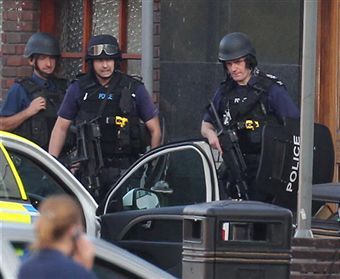 This afternoon I had the privilege to speak in a panel discussion at the National
Policing Conference in Manchester, held jointly by ACPO (Association of Chief Police Officers) and the APA (Association of Police Authorities). The subject was the future of policing – a
particularly important one given the potential 25 per cent cut in budgets the service is expecting.
This afternoon I had the privilege to speak in a panel discussion at the National
Policing Conference in Manchester, held jointly by ACPO (Association of Chief Police Officers) and the APA (Association of Police Authorities). The subject was the future of policing – a
particularly important one given the potential 25 per cent cut in budgets the service is expecting.
To the credit of the Police, they’re already pioneering examples of the kind of changes that can save a lot of money while seeing services improve. Surrey, for example, has greatly increased the
proportion of civilian staff in its force, acknowledging that they can do many jobs better and cheaper than uniformed officers. Kent and Essex have an advanced collaboration programme, sharing
everything from helicopters to HR, that has saved millions of pounds.
And the Police (or at least Chief Constables) are rightly open to the idea of looking again at Police pay and conditions, particularly restrictions in police contracts that make overtime expensive,
or that prevent Police Chiefs from deploying their officers in appropriate shift patterns.
The real sticking point, though, is accountability. Reform has long advocated elected commissioners as a way to
create a direct mechanism for local people to hold the police and the whole criminal justice system to account. The new Government has, encouragingly, promised to implement these in some form.
A directly elected individual, who can direct the police’s budget and strategic priorities, can ensure that each Police Force is focusing on what local people really want and – critically – can
hold Chief Constables to account for delivering value for money.
Unfortunately, there was a broad consensus among delegates at the conference that the current “quasi-democratic” accountability mechanism is preferable. That isn’t surprising
since police authorities have enough of a role to make their members feel important but not enough power to hold chief constables to account. Chief Constables are the least accountable
leaders of any public service in the UK. It is no surprise that the UK law and order budget (as a share of GDP) is the highest of any major country. Because nearly all policing is
local, the right idea is to create real democratic mandates for change at the local level.
Some of the APA and ACPO representatives today gave me short shrift when I made these points. The better way for these organisations is to join the debate on reform and value for money. The
best way to solve the deficit is to make the public sector genuinely accountable.
Dale Bassett
The case for elected police commissioners






Comments